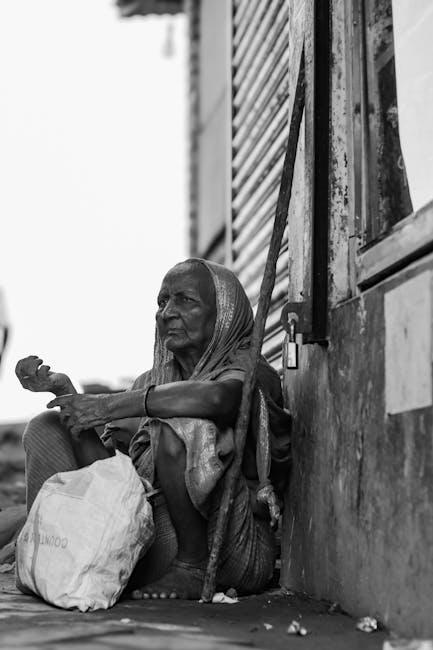In the vibrant tapestry of global travel, family vacations are often painted as idyllic escapes, opportunities for bonding, exploration, and relaxation. Yet, amidst the snapshots of sun-drenched beaches and bustling theme parks, a new trend has emerged that invites families to step off the beaten path: poverty tours. These excursions, which take tourists into impoverished communities, promise an unvarnished glimpse into the lives of those living in stark contrast to typical holiday destinations. As this trend gains momentum, it raises profound ethical questions. Are these tours a form of responsible tourism, fostering awareness and empathy, or do they merely commodify the struggles of the less fortunate for entertainment? This article delves into the complexities of poverty tours, exploring their impact on both tourists and the communities they visit, and seeking to illuminate the moral landscape that families must navigate when choosing such unconventional travel experiences.
Understanding the Allure of Poverty Tours in Family Travel
In recent years, the concept of poverty tours has become an intriguing yet controversial component of family travel. These tours offer families a firsthand glimpse into the lives of those living in economically disadvantaged areas. The allure lies in the authenticity and rawness of the experience, providing a stark contrast to the typical sanitized tourist destinations. For some families, it becomes an opportunity to educate their children about global inequalities, fostering empathy and a sense of responsibility. However, the ethical implications of such tours are often questioned, as they walk a fine line between education and exploitation.
- Educational Value: Provides a real-world context for discussing socio-economic issues.
- Cultural Exchange: Offers an opportunity to interact with local communities in a meaningful way.
- Potential for Exploitation: Raises concerns about voyeurism and respecting the dignity of those being observed.
- Economic Impact: Questions whether the tours genuinely benefit the communities or merely profit from them.
Examining the Ethical Implications for Young Travelers
As families consider the ethics of poverty tours, the impact on young travelers deserves careful reflection. These tours, which often highlight the struggles of impoverished communities, can shape a child’s understanding of global disparities. For young minds, the experience can offer valuable insights into resilience and resourcefulness, but it also risks fostering a sense of voyeurism if not approached thoughtfully.
- Empathy and Awareness: Children can develop empathy by witnessing the challenges faced by others, fostering a deeper understanding of global issues.
- Potential for Misinterpretation: Without proper context, young travelers may form simplistic or skewed perceptions of poverty.
- Role of Education: Engaging discussions and educational resources can help children process their experiences constructively.
Families must weigh the educational benefits against the ethical concerns, ensuring that young travelers approach these experiences with sensitivity and respect. This requires guiding them to understand the complexities of poverty beyond the surface, turning a potentially controversial experience into a meaningful learning opportunity.

Balancing Educational Value with Respectful Engagement
When planning a family vacation that includes visits to impoverished areas, it’s crucial to weigh the educational benefits against the potential impact on local communities. Engaging in such experiences can offer profound insights into social and economic disparities, but they must be approached with sensitivity and respect. Here are some key considerations to ensure your family’s experience is both informative and ethically responsible:
- Educate Before You Go: Spend time learning about the community’s history and current challenges. Understanding the context helps frame your visit and encourages thoughtful discussions.
- Choose Responsible Tour Operators: Opt for tours that are organized by local operators who prioritize community welfare. These operators often reinvest in the area and work to uplift residents.
- Engage Respectfully: Interact with community members in a manner that acknowledges their dignity. Avoid taking intrusive photos or treating the experience as a spectacle.
- Reflect and Share: After your visit, discuss what you’ve learned with your family. Sharing insights with others can spread awareness and encourage more ethical travel practices.
By carefully , families can enrich their travel experiences while contributing positively to the communities they visit. This approach not only broadens perspectives but also fosters a deeper understanding of global issues.

Guidelines for Choosing Responsible and Ethical Tour Operators
When planning a family vacation that includes a visit to economically disadvantaged areas, it’s crucial to select a tour operator that prioritizes ethical practices and genuine community engagement. Look for operators that emphasize respect for local cultures and contribute positively to the communities they showcase. This involves understanding the impact of tourism on local populations and ensuring that a portion of the proceeds benefits the community directly.
- Transparency: Opt for operators who are clear about where your money goes and how it supports the local economy.
- Community Involvement: Choose tours that are led by locals or involve local guides, offering authentic insights and ensuring that the economic benefits remain within the community.
- Education and Awareness: Prioritize tours that focus on educating visitors about the social and cultural context of the areas visited, fostering a deeper understanding and respect.
- Respectful Interactions: Ensure that the operator promotes respectful interactions, avoiding any form of exploitation or voyeurism.
By choosing tour operators that adhere to these principles, families can enjoy enriching experiences while contributing positively to the communities they visit.






























